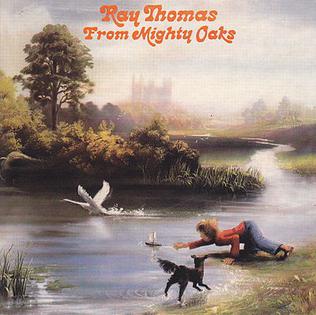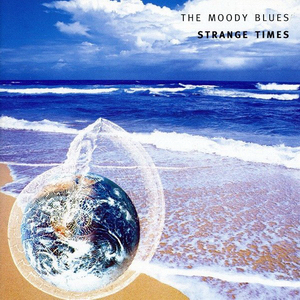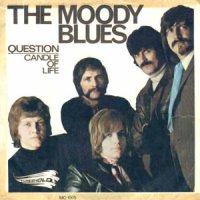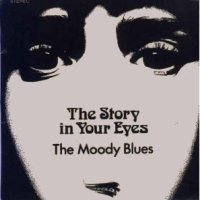
The Moody Blues were an English rock band formed in Birmingham in May 1964. The band initially consisted of drummer Graeme Edge, guitarist/vocalist Denny Laine, keyboardist/vocalist Mike Pinder, multi-instrumentalist/vocalist Ray Thomas, and bassist/vocalist Clint Warwick. Originally part of the British beat and R&B scene of the early–mid 1960s, the band came to prominence with the UK No. 1 and US Top 10 single "Go Now" in late 1964/early 1965. Laine and Warwick left the band by the end of 1966, being replaced by guitarist/vocalist Justin Hayward and bassist/vocalist John Lodge. They embraced the psychedelic rock movement of the late 1960s, with their second album, 1967's Days of Future Passed, being a fusion of rock with classical music that established the band as pioneers in the development of art rock and progressive rock. It has been described as a "landmark" and "one of the first successful concept albums".

Electronic drums are a modern electronic musical instrument, primarily designed to serve as an alternative to an acoustic drum kit. Electronic drums consist of an electronic sound module which produces the synthesized or sampled percussion sounds and a set of pads, usually constructed in a shape to resemble drums and cymbals, which are equipped with electronic sensors to send an electronic signal to the sound module which outputs a sound. Like acoustic drums, the pads are struck by drum sticks and they are played in a similar manner to an acoustic drum kit, albeit with some differences in the drumming experience.

Every Good Boy Deserves Favour is the seventh album by The Moody Blues, released in 1971. The album reached No. 1 on the British album chart, in addition to a three-week stay at No. 2 in the United States, and produced one top-40 single, "The Story in Your Eyes".

Graeme Charles Edge was an English musician, songwriter and poet, best known as the co-founder and drummer of the English band the Moody Blues. In addition to his work with the Moody Blues, Edge worked as the bandleader of his own outfit, the Graeme Edge Band. He contributed his talents to a variety of other projects throughout his career. In 2018, Edge was inducted into the Rock and Roll Hall of Fame as a member of the Moody Blues.

From Mighty Oaks is the first solo album by Moody Blues flautist Ray Thomas together with Nicky James, Trevor Jones, Dave Potts, John Jones and Mike Moran. It was originally released in July 1975 and reissued on Compact Disc in August 1989. Despite the reissue, the album remains quite rare, particularly on CD.

Sur la Mer is the thirteenth album by the Moody Blues. It was released in 1988. It features the hit single "I Know You're Out There Somewhere", a sequel to their 1986 hit "Your Wildest Dreams". Much of the music on the album would fit in the "synthpop" genre, though it does incorporate more rock and acoustic influences than its predecessor.

Strange Times is the fifteenth and penultimate studio album by the rock band the Moody Blues, released in 1999. The sound features mostly acoustic guitar, slightly processed electric guitar, light organ, flute, and string arrangements, with heavy synthesizer use in the fast-paced opening track, "English Sunset". This was the last Moody Blues album to feature longtime flautist and vocalist Ray Thomas.

"Ride My See-Saw" is a 1968 single by the English progressive rock band the Moody Blues. It was written by the band's bassist John Lodge, and was first released on the Moody Blues' 1968 album In Search of the Lost Chord. It was the second of two singles from that album, the other being "Voices in the Sky".

"I'm Just a Singer (In a Rock and Roll Band)" is a 1973 hit single by the English progressive rock band the Moody Blues, written by the band's bassist, John Lodge. It was first released in 1972 as the final track on the album Seventh Sojourn and was later released as a single in 1973, with "For My Lady" as its B-side. It was the second single released from Seventh Sojourn, with the first being "Isn't Life Strange", which was also written by Lodge.

"I Know You're Out There Somewhere" is a 1988 single by the English rock band the Moody Blues. It was written by guitarist Justin Hayward, and it is the sequel to the Moody Blues' 1986 single "Your Wildest Dreams", also written by Hayward. It is the band's final Top 40 single in the United States, peaking at #30 on the Billboard Hot 100.

"Question" is a 1970 single by the English progressive rock band the Moody Blues. It was written by guitarist Justin Hayward, who provides lead vocals. "Question" was first released as a single in April 1970 and remains their second highest-charting song in the UK, reaching number two and staying on the chart for 12 weeks. The song reached number 21 on the Billboard Top 40 in the USA. It was later featured as the lead track on the 1970 album A Question of Balance. The single also features the song "Candle of Life" on its B-side, which was from the Moody Blues' previous album To Our Children's Children's Children.

"The Story in Your Eyes" is a 1971 hit single by the English rock band the Moody Blues. Written by the band's guitarist Justin Hayward, it was first released as a single with "My Song" on the B-side, and then on the 1971 album Every Good Boy Deserves Favour shortly after.

"Blue World" is a 1983 single by the Moody Blues written by Justin Hayward. It was first released in the UK as the lead single of the album The Present in August 1983. It was released as single in the US in the Fall of 1983. "Blue World" was one of three singles from The Present, with the others being "Sitting at the Wheel" and "Running Water." The single's cover is a pastiche of the painting Daybreak by Maxfield Parrish.
"Dr. Livingstone, I Presume" is a 1968 song by the English rock band the Moody Blues. It was written by the band's flautist Ray Thomas, although he does not play the flute in the song. First released in June 1968 on the B-side of "Voices in the Sky," "Dr. Livingstone, I Presume" is one of Ray Thomas's signature child-themed songs, much like his first composition "Another Morning."
"The Best Way to Travel" is a 1968 song by the progressive rock band the Moody Blues. Written by keyboardist Mike Pinder, it was released on the album In Search of the Lost Chord. A wide stereo panning effect, made by the pan pots on the Decca Studios custom-built four-track recording console used during 1967–68, is noticeable on this track.
"Higher and Higher" is the opening track of the Moody Blues 1969 album To Our Children's Children's Children, a concept album about space travel.

"No More Lies" is the second single released from the Moody Blues 1988 album Sur la Mer. As a single, it charted at #15 on the Adult Contemporary chart in 1988. Like the album's previous single, "I Know You're Out There Somewhere," "No More Lies" was written by Justin Hayward.

Michael Thomas Pinder was an English rock musician. He was a founding member and the original keyboard player of the rock group the Moody Blues. He left the group following the recording of the band's ninth album Octave in 1978. Pinder was renowned for his technological contributions to rock music, most notably in the development and emergence of the Mellotron in 1960s rock music. In 2018, he was inducted into the Rock and Roll Hall of Fame as a member of the Moody Blues. He was the last surviving member of the group's original lineup.

Gold is a compilation album by The Moody Blues, released in 2005 by Polydor Records as part of Polydor's Gold series.
"A Simple Game" is a 1968 song by the progressive rock band the Moody Blues. Written and sung by Mike Pinder, it was released as a non-album B-side to "Ride My See-Saw", a track from the album In Search of the Lost Chord. The song was produced by Tony Clarke and arranged by Arthur Greenslade. The track was included in the band's 1974 compilation, This Is The Moody Blues, remixed and with an earlier fade than on the single. It was also included, with its original mix and length, in the 1987 compilation Prelude.















